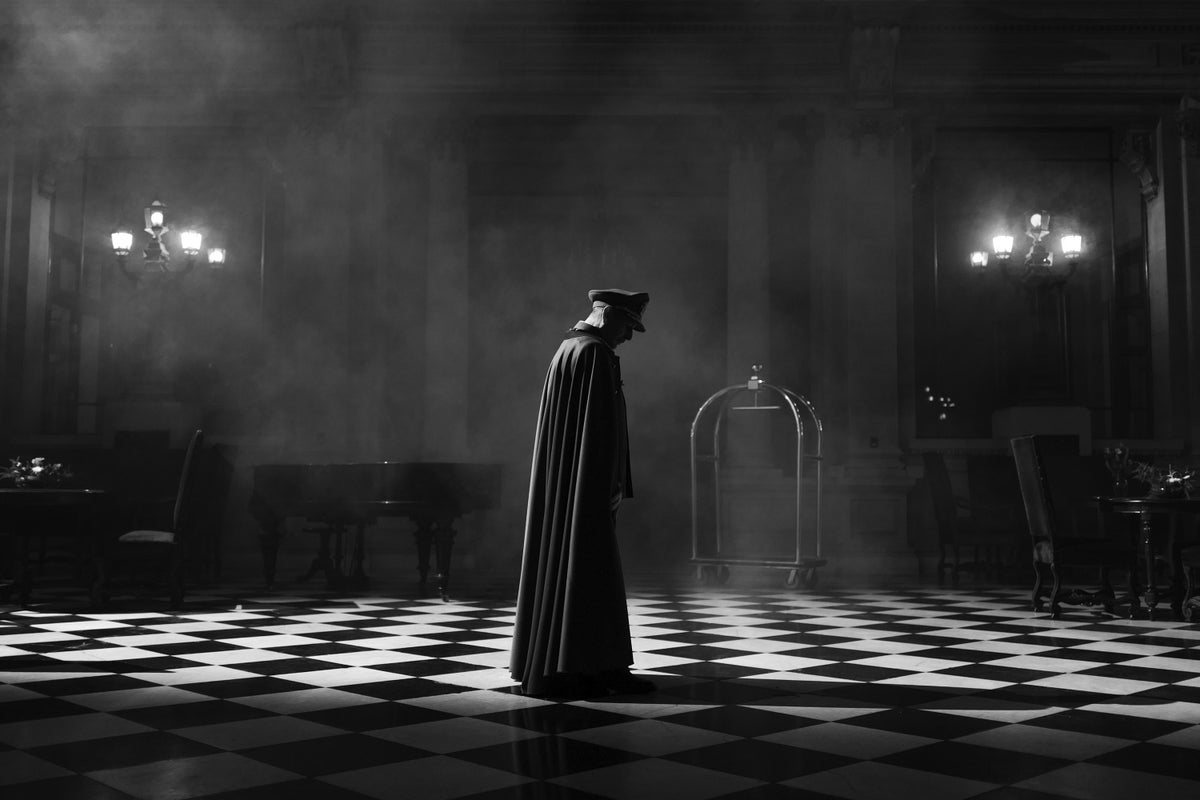
El Conde, the latest from Pablo Larraín, best known for his portraits of history’s haunted women, Jackie (2016) and Spencer (2021), is a punchline delivered with the cadence of a howl. It’s a vampire story, in which the dictator Augusto Pinochet, who terrorised Larraín’s native Chile from 1973 to 1990, is cloaked, fanged and transformed into the habitual blood-guzzler of Bram Stoker’s imagination.
The film’s political outlook is a little fuzzy – or, at the very least, lacking the insight and urgency of Larraín other films about Pinochet’s reign, Tony Manero (2008), Post Mortem (2010), and No (2012) – but it bleeds pure, righteous bitterness. Larraín jumps at the chance to turn political ideology into a literal horror show. We see Pinochet, on the hunt, silently gliding above downtown Santiago.
El Conde actually begins in 18th-century Paris, where a soldier of Louis XVI’s army, Claude Pinoche, is initiated into vampirehood. He’s quickly horrified by the revolutionary fervour in the air. And so, with the decapitated head of Marie Antoinette tucked under his arm, he treks the globe in order to quash freedom and democracy wherever he can find it, cropping up throughout history like a reanimated Forrest Gump. Pinoche becomes Pinochet (Jaime Vadell). Eventually, he ends up in Chile, leading the military coup that overthrew Salvador Allende’s socialist government, a dark day in the country’s history that marked its 50th anniversary this week.
We’re told this little bit of backstory by an offscreen narrator (Stella Gonet), whose identity is kept secret until they swoop into the narrative themselves – a hell of a reveal, even if Gonet’s practised, slow-drip, flaccid tone makes it an instant giveaway. Pinochet died in 2006, at the age of 91; here, it’s revealed that he faked his death, in order to linger in extended retirement somewhere in the Chilean countryside with his wife Lucía (Gloria Münchmeyer) and Russian butler Fyodor (Alfredo Castro). Occasionally, Fyodor will grab a heart out of the freezer, shove it in a blender, and craft for his master the most unholy of smoothies.
Pinochet falls into a monster’s depression, resentful that he’s been forced to witness history brand him as a thief (a pox, surely, on his legacy as a murderer and tyrant). “Why would I want to keep on living in a country where people hate me?” he cries. El Conde is a loose, languid film, and its black-and-white cinematography by Edward Lachman deliberately makes it look like a hollowed-out, editorialised take on the darkened silhouettes of FW Murnau’s Nosferatu. Lucía cheats on him with Fyodor. His five adult children turn up demanding their inheritance. Everyone snipes at each other like starved rats. It’s a misery that borders on karma.
But as much as Vadell plays his Pinochet as sickly and pathetic; Juan Pablo Ávalo and Marisol García’s score descends into a demonic hum whenever he enters a room. We’re never allowed to stray too far from the reminders of the torture and executions he oversaw. His evil has simply slipped behind the mask of senility, and it’s enough to trick Carmen (Paula Luchsinger), the young nun sent to exorcise his soul, who is shot beatifically like Carl Theodor Dreyer’s The Passion of Joan of Arc.
During Pinochet’s funeral (faked, of course), a mourner spits at his coffin, knowing it’ll be intercepted by the plastic sheet protecting his corpse. Larraín, perhaps, sees El Conde as much the same. It’ll never reach its intended target, but the rage is still worth it.
Dir: Pablo Larraín. Starring: Jaime Vadell, Gloria Münchmeyer, Alfredo Castro, Paula Luchsinger. 15, 110 minutes.
‘El Conde’ streams on Netflix from 15 September







